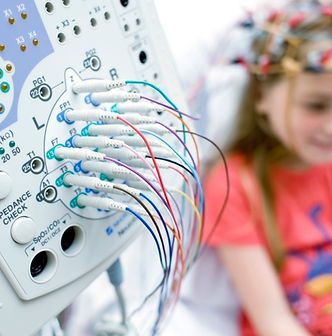Now Accepting Insurance for qEEG, Autism Therapy, and Depression Treatment, We verify benefits for you.
We Work with BCBS, Aetna, UnitedHealthcare, Cigna and Most PPO plans (OON)
NEW: Leucovorin (Folinic Acid) Therapy for Autism
Reign-Bow Brain Treatment Center now offers Leucovorin Therapy, a research-supported treatment shown to help improve:
-
Speech & expressive language
-
Behavior and irritability
-
Social engagement
-
Cognitive development
Many children with autism have reduced brain folate levels. Leucovorin supports healthy neurological function and may improve communication and developmental outcomes.
Learn More About Leucovorin Therapy →
Call 630-448-2721 to Schedule an Evaluation
Autism Therapy In Lombard, IL Using qEEG & MeRT
AUTISM THERAPY AT
REIGN-BOW BRAIN TREATMENT CENTER
Personalized Brain Stimulation Designed for Children, Teens & Adults with Autism
What Is Autism Therapy at Reign-Bow?
Our autism therapy program uses qEEG-guided brain stimulation (TMS) + MeRT
to improve brain connectivity, communication, emotional regulation, sensory processing, and cognitive function. By identifying dysregulated brainwave patterns through qEEG, we create personalized neuromodulation protocols designed specifically for each individual’s unique needs. Explore how our Specialized Treatments and Personalized Protocols can Support Cognitive and Emotional Health Revolutionizing Autism Treatment with Cutting-EdgeTechnology.

What Is Brain Stimulation Therapy for Autism?
Brain Stimulation Therapy is a non-invasive, medication-free treatment that combines:
-
rTMS (Repetitive Transcranial Magnetic Stimulation)
-
qEEG (Quantitative EEG brain mapping)
-
ECG (heart–brain synchronicity analysis) MeRT (Magnetic e-Resonance Therapy)
Transcranial Therapy, is an innovative approach designed to address the neurological complexities associated with autism spectrum disorder. Unlike traditional therapies, we targets specific neural pathways, promoting neuroplasticity and facilitating more efficient communication within the brain.
Using these tools, we identify the exact regions of the brain that are overactive, underactive, or not communicating effectively — then apply gentle magnetic stimulation to support healthier brainwave activity. This approach is safe, non-surgical, and tailored to each child or adult’s neurological patterns.
How qEEG Brain Mapping Helps Autism
qEEG brain mapping is one of the most important steps
in our treatment process. It allows us to identify:
-
Excess slow-wave (delta/theta) activity
-
Frontal lobe underactivation
-
Auditory + language processing delays
-
Visual processing dysregulation
-
Left–right brain communication differences
-
Overconnectivity or underconnectivity
-
Timing delays in brainwave coordination
-
Regions responsible for behaviors, speech, and sensory responses
This data guides the creation of your personalized brain stimulation

Unlock the potential for a brighter future, this therapy has protocols designed specifically for individuals with autism based on their individual brain mapping. Developed by leading experts in the field, treatment offers a safe, non-invasive, and highly effective approach to managing the challenges associated with autism spectrum disorder (ASD).


Welcome to our FAQ page where we address common questions about therapy at Reign-Bow Brain treatment Center. Whether you're considering treatment for Autism,depression, anxiety, or other conditions, we're here to provide answers to help you make an informed decision.
FAQ.
Mert therapy is a specialized treatment option suitable for individuals experiencing various mental health conditions. Here’s a detailed description of the typical patient profile and conditions treated with Mert therapy:
Typical Patient Profile for Stimulation Treatment
Therapy is generally considered for individuals who meet the following criteria:
-
Diagnosis of Treatment-Resistant Mental Health Conditions:
-
Depression (Major Depressive Disorder and Persistent Depressive Disorder): Treatment is particularly beneficial for individuals who have not achieved adequate relief from symptoms with antidepressant medications or psychotherapy alone.
-
Obsessive-Compulsive Disorder (OCD): Especially for patients whose symptoms persist despite conventional treatment methods.
-
Post-Traumatic Stress Disorder (PTSD): As a potential treatment option for PTSD, especially in cases where other therapies have not been effective.
-
-
Autism Spectrum Disorder (ASD) and ADHD (Attention-Deficit/Hyperactivity Disorder):
-
Treatment is primarily known for treating mood disorders, and the benefits for managing symptoms associated with ASD and ADHD.
-
-
General Health and Treatment History:
-
Candidates should generally be in good physical health, with considerations made for any medical conditions that may affect the suitability of MeRT therapy.
-
Candidates typically have a history of trying and not responding adequately to traditional treatments or experiencing significant side effects from medications.
-
-
Desire for Non-Invasive Treatment:
-
Many candidates prefer this treatment option because it is non-invasive, meaning it does not require surgery or anesthesia, and is generally well-tolerated compared to some medications.
-
What is Transcrianila Stimulation, and how does it relate to autism?
• Treatment is a non-invasive procedure that uses magnetic fields to stimulate nerve cells in the brain. While it has shown some promise in treating certain mental health conditions, its effectiveness for autism is still being researched. Stimulation Therapy is being explored as a potential tool to address specific symptoms associated with autism, such as repetitive behaviors and social communication challenges.
Do you take Insurance ?
• Currently, we are not in network with any insurance carriers.
Are there any risks or side effects associated with treatment for autism?
• While treament is generally considered safe, potential side effects may include mild headaches, scalp discomfort, or muscle contractions during treatment
Who might benefit from treatment for autism?
• Currently, individuals with autism experiencing specific symptoms, such as repetitive behaviors, difficulties in social interactions, poor sleep hygiene, aggressive behavior or those who are nonverbal or not potty trained.
How Long is treatment ?
Treatment can vary based on doctors recommendations but typically 4 to 6 weeks 8 week max.
How long is each session ?
Each session is 30 minutes per day day days a week. Two weeks consist of one session.
Consulting with Our qualified healthcare provider to determine if treatment is suitable for you or your love ones specific condition and treatment history.
